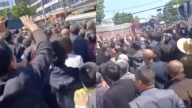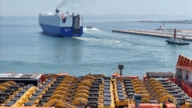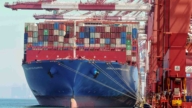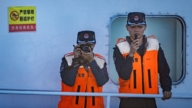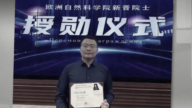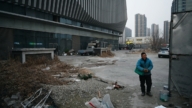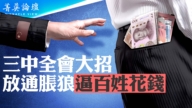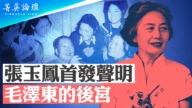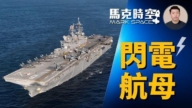【新唐人2012年12月28日訊】被稱為世界最長距離的「京廣高速鐵路」試車成功:全線300公里的時速,從北京到廣州僅需8小時,比原來最快列車快了12多個小時。但花費近4000億的天價,讓人想到腐敗的加重﹔每年巨額的利息,使得運營面臨數十年的虧損﹔高昂的票價也令普通百姓大呼「坐不起」。
京廣高速鐵路26號首次試車,從北京西站出發,中間經石家莊、鄭州、武漢、長沙到達廣州,經過8個小時完成了2千3百公里的行程。預計從北京到廣州的高鐵,將在中國新年期間正式開通。
根據公布的京廣高鐵票價表,北京到廣州,最便宜的「二等座」票價為865元,最貴的「商務座」則高達2727元。時速超過200公里的「D字頭列車」,北京到廣州二等座票價為712元。
而北京到武漢的高鐵二等座售價為530元,D字頭則為381元。很多網友高呼「坐不起」。
北京師範大學MBA導師 段紹譯:「高鐵,它是用時間換金錢,坐車老百姓的時間沒有那麼值錢的話,高鐵價格定低了,它就是虧損的,價格定高了就沒人坐。目前來講,高鐵主要是上流社會的事情。」
北京王姓網友認為,高鐵根本不是為普通老百姓準備的,再多高鐵也不能改變普通列車越來越擠的現實。
北京網民 王先生:「上訪的絕對是不坐高鐵的,沿途的那些一般的探親訪友的,他也是能不坐就不坐。甚麼人願意坐呢?肯定就是公務員、大公司(職工),這些人願意坐。這些人的費用全部是報銷的,公務員花的是納稅人的錢。」
「中國社科院經濟研究所」研究員徐逢賢指出,如果由於價格過高,使高鐵上座率達不到90%,就說明高鐵運輸狀態處於不良狀態。
事實上,「京津高速城際鐵路」運行兩週年的平均上座率為70%,而2012年的中國新年,「京滬高鐵列車」的上座率也普遍在7成左右。
但「京廣高鐵」的另一些資料同樣被外界所關注,如:總耗資近4000億,其中90%資金是貸款,每年需支出幾十億的貸款利息等。
「北京交通大學經濟管理學院」教授趙堅認為,京廣高速鐵路建設成本高,運行成本高,票價沒辦法覆蓋成本,可能會嚴重虧損達十年甚至二十年。趙堅透露,目前所有的高鐵都處於虧損狀態,京津高鐵運營每年淨虧損7億元。
北京師範大學MBA導師兼經濟專欄作家的段紹譯還表示,北京到廣州的高鐵不是市場行為,根本沒有考慮投入和產出,因為國有企業是花別人的錢、辦別人的事,效率肯定是要打折扣。
《湖南日報》報業集團旗下的《華聲在線》揭露:京廣高鐵上所安裝的座椅,一把價值23萬。今年2月還爆出:所有高鐵列車採購的自動洗面器,一個價值7.2萬元,一個洗面臺2.6萬,一個感應水閥1.28萬,一個衛生間紙巾盒1125元。這些設施都由鐵路部門的指定供應商提供。
其實,前鐵道部長劉志軍、和原總工程師周曙光案件,就暴露了鐵道部的腐敗窩案,僅張曙光在海外存款高達28億美元,涉案人員包括15名副局級高官。
廣州網友劉遠東:「它的當官的官僚體制,基本上都是從中央買官賣官,因為假設你作為一個領導人的話,你要提拔一個人肯定就有好處了。現在所謂的朋友、甚麼親戚啊,這些所謂社會關係,很多時候並不可靠,那最可靠的就是金錢啦。」
《法新社》評論指出,京廣高鐵是中國大陸快速建設高速鐵路的一個新里程碑,但是中國高速鐵路的發展也曾經傳出貪污和安全醜聞,如2011年7月溫州高鐵追撞事故就造成40人死亡,至今讓人們記憶猶新。
採訪/朱智善 編輯/宋風 後製/蕭宇
China’s 400-Billion-yuan High-Speed Rail Line Opens
The Jingguang high speed rail line from Beijing
to Guangzhou recently made its first trial run.
It is viewed as the world’s longest high-speed railway line,
with an 8-hour journey at a speed of 300 km per hour.
This provides a saving over 12 hours
in comparison to alternatives.
However, it has reportedly cost nearly 400 Billion yuan,
arousing the public’s suspicion of intense corruption.
Huge annual loan interest expenses will make rail
service a continuous red-ink for the next decade.
Expensive fares have made ordinary
people cry out, “we can’t afford it.”
On December 26, Jingguang high-
speed rail line held its first trial run.
It traveled over 2,300 kms from
Beijing to Guangzhou in eight hours.
The route is expected to begin operating
during the 2013 Chinese New Year.
The table for prices of tickets shows that the second
class is the cheapest available at 865 yuan.
Business class is most expensive at 2,727 yuan.
For Jingguang high-speed trains identified
with “D”, its second-class ticket costs 712 yuan.
A second-class ticket costs 530 yuan
for the Beijing-Wuhan high-speed rail.
For the “D” -train on the same route, it costs 381 yuan.
Many citizens complained that they cannot afford it.
Duan Shaoyi, tutor for MBA students,
Beijing Normal University:
“People spend money to take
the high-speed train to save time.
If the fares are too cheap, it will make a loss;
but too costly will scare ordinary passengers.
So far, high-speed trains
mainly serve the rich in China.”
Mr. Wang, Beijing netizen, says that high-speed
rail trains are not made for ordinary people.
No amount of high-speed trains could solve the problem.
In reality, regular trains are getting
increasingly crowded, he says.
Mr. Wang: “Petitioners traveling to Beijing
will definitely not take high-speed trains.
Nor will ordinary people when visiting relatives and
friends, so who is willing to take high-speed trains?
Certainly those are civil servants,
and employees of large firms.
Their traveling expenses are all reimbursed.
Civil servants actually spend taxpayers’ money.”
Xu Fengxian, researcher at the Chinese
Academy of Social Sciences, commented.
If high-speed train fares are so expensive that they
achieve less than 90% for seat occupancy rate,
that shows high-speed rail transport is poor, he says.
In the past two years, the Beijing-Tianjin high-speed
rail has given an average daily attendance of 70%.
During the 2012 Chinese New Year, the Beijing-Shanghai
high-speed rail train generally saw daily attendance of 70%.
Data related to the Jingguang high-speed
rail line has become public concern.
This includes the total cost of nearly 400 Billion yuan.
90% of capital came from loans, and
Billions of yuan in annual loan interest.
Zhao Jian, professor at the Economics & Management
School, Beijing Jiaotong University, disclosed information.
Due to high costs in construction and operation, fares for
Jingguang high-speed rail trains cannot cover the costs.
Worse still, a huge loss may
last for a decade or even longer.
Zhao Jian revealed that currently, all high-speed
rail trains in China have been in the red.
Each year, the Beijing-Tianjin high-speed rail
sees a net loss of 700 Million yuan, says Zhao.
Duan Shaoyi remarks that the Jingguang
high-speed rail was not a market-based decision.
There was no consideration of inputs and outputs.
Duan interpreted that China’s state-owned enterprises
never spend their own money and offer benefits to others.
Therefore, the efficiency will certainly be lower.
“voc.com.cn” reported that each seat in a Jingguang
high-speed rail train costs 230,000 yuan.
During this February, media exposed sky-high
toilet facilities on China’s high-speed rail trains.
An automated hand-wash basin costs over 70,000 yuan.
A colorful marble washstand costs 26,000 yuan.
A sensor-activated faucet costs over 12,000 yuan,
and a tissue box costs over 1,100 yuan.
All items were purchased through designated
suppliers by the Railways authorities.
Collective corruption has been unveiled to the public when
the cases of Liu Zhijun and Zhang Shuguang were exposed.
Liu Zhijun was the former CCP Railways Minister.
Zhang Shuguang was the Railways
Ministry’s former deputy chief engineer.
Zhang himself owned US$ 2.8 Billion
of overseas bank deposits.
The case implicated 15 deputy level CCP officials.
Liu Yuandong, Guangzhou netizen: “The regime’s
officialdom is filled with buying and selling official positions.
A CCP cadre will definitely reap
benefits if promoting someone.
Nowadays, the so-called social relations like friends
or relatives are all unreliable, most of the time.
The most reliable is just money.”
Agence France-Presse reviewed that the Jingguang
high-speed rail is a new milestone in China’s rapid
construction in this field, but there have been repeated
reports of corruption scandals and train accidents.
AFP cites the example of Wenzhou’s bullet train
crash in July 2011, which caused 40 deaths.


